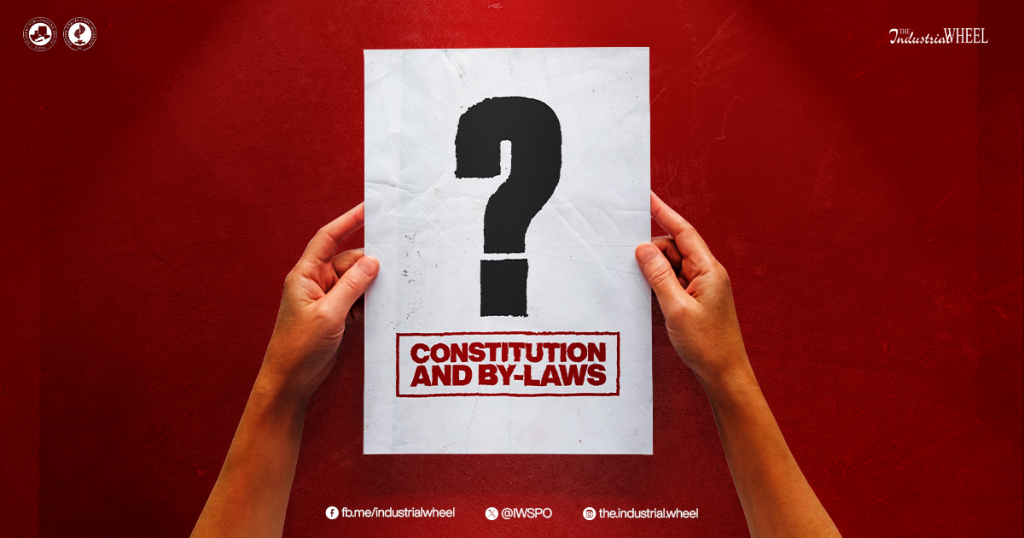
The Electoral Tribunal has earlier underscored that the special elections’ aim is to create a provisionary student government, with its sole task being to amend the Constitution and By-Laws of the organization. The Constitution and By-Laws, or the CBL, of the Supreme Student Government (SSG) has not been amended, with its latest iteration being promulgated in 2007; 17 long years where no changes or revisions were made to the document.
An organization’s constitution holds the fundamental principles which ascertain the rights and responsibilities of the officers and the members of the organization, while the bylaws institutes specific rules of guidance and detailed procedure which governs its overall operations. An organizations bible should be regularly updated and amended to better cater to the student community and their learning environment.
Even though the administrations held their respective campaigns to finally amend the constitution and by-laws of the student government organization, their attempts were hampered by factors regarding the finalization of the revision of the said document.
Sitting President Dawn Oquiño stressed that they underwent the primary process but got declined, which pushed them to proceed with the constitutional convention process.
“We were successful in obtaining legislation, but it got rejected so we proceeded with Constitutional Convention. From there, we obtained ten percent from all the campuses, including the main campus and the external campuses,” Oquiño said.
The constitutional convention is a process by which a total of ten percent from the total student population of the university must be obtained. If obtained successfully, the proposal will proceed to the readings.
According to Oquiño, the main reason why the attempt was unsuccessful is because of the Electoral Members and Chair’s refusal to sign the petition letter, citing that they are not members of the tribunal anymore.
“The previous Tribunal Chair already resigned, and the position was already relinquished to the new Student Affairs Office (SAO) Head. We sought after the previous chair and insisted, but said she will not affix her signature because she is no longer the Head,” the SSG President said in an interview.
However, despite the unsuccessful attempt, she revealed that a proposal for the second reading already exists if the prior issue does not surface.
She stated further that it would become a challenge for the next President to make the amendments or the revisions, especially with the constitutional convention process because of the insufficient number of students present during their term.
Meanwhile, former President Orlando De Paz stated that during his term, after several attempts, they were successful in making amendments through the constitutional convention process, but faced issues due to lacking a document.
“Actually, we successfully amended the constitution and by-laws during my term. However, the moment it was already amended, the Electoral Tribunal called for a meeting with regards to the by-laws. We presented and defended the by-laws; however, they were looking for a document, which is the Implementing Rules and Regulations or the IRR to be created by the legislative body.”
The IRR are the detailed rules and guidelines that accompany a law or regulation. They provide specific instructions on how to implement and enforce the provisions of the law.
Due to time constraints and due to the lack of IRR during submission, they were unsuccessful in the amendment and were asked to repeat the process from the beginning.
Despite that, De Paz expressed his aspirations to the next set of officers, which is to successfully amend the Constitution and By-Laws and enhance provisions in the by-laws that caters to students’ needs, and not personal interests.
The meager time provided, a period of just two months, will ultimately pose as the amendment’s biggest hurdle. Should they fail to amend, another election will be done and will again put the revision on hold as we are yet to see meaningful changes to the constitution and by-laws.
The challenges encountered by the past administration’s prior attempts should be considered as antecedents by the soon-to-be elected officials of the student government, as they begin to undertake the task their government was created for; to finally dot the 17-year long period of where there is no real, meaningful change to the standards set for the student leaders, for the student government’s election, and for the student government itself.
Article by Liziel Ann Altejar
